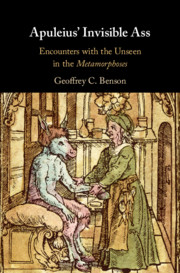
-
Select format
-
- Publisher:
- Cambridge University Press
- Publication date:
- 04 May 2019
- 09 May 2019
- ISBN:
- 9781108602501
- 9781108475556
- Dimensions:
- (228 x 152 mm)
- Weight & Pages:
- 0.64kg, 308 Pages
- Dimensions:
- Weight & Pages:
- Subjects:
- Classical Studies, Classical Literature
You may already have access via personal or institutional login- Subjects:
- Classical Studies, Classical Literature
Book description
Apuleius' Metamorphoses (or The Golden Ass), a masterpiece of Latin literature from the second century AD, still captivates modern readers with its combination of asininity and mysticism. In the novel, a young man named Lucius tells how he accidentally turns into a donkey and then describes how he regains human form with the help of the Egyptian goddess Isis, into whose cult he is initiated. This book argues that invisibility is one of the central motifs in the Metamorphoses and, in the process, presents a new interpretation of Apuleius' novel as a visionary, esoteric text. It contributes both to the study of the subtle relationship between literature and Platonic philosophy and to the cultural history of invisibility in classical antiquity and beyond.
Reviews
‘… Apuleius’ Invisible Ass is a rich treasure-trove of analysis … The text itself is well-produced … the chapters are nicely laid-out in easily manageable thematic sections.’
Jeffrey Ulrich Source: Bryn Mawr Classical Review
'… a work that is itself a diverting pleasure to read and whose contemplation is sure to lead the reader, if not to philosophical transcendence, then at least to a higher understanding of Apuleius’ novel.'
Evelyn Adkins Source: Plekos
Contents
Metrics
Altmetric attention score
Full text views
Full text views help Loading metrics...
Loading metrics...
* Views captured on Cambridge Core between #date#. This data will be updated every 24 hours.
Usage data cannot currently be displayed.
Accessibility standard: Unknown
Why this information is here
This section outlines the accessibility features of this content - including support for screen readers, full keyboard navigation and high-contrast display options. This may not be relevant for you.
Accessibility Information
Accessibility compliance for the PDF of this book is currently unknown and may be updated in the future.


